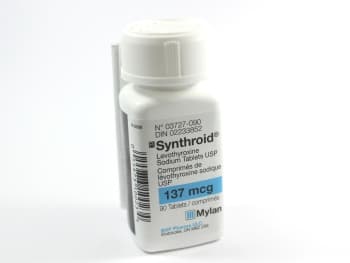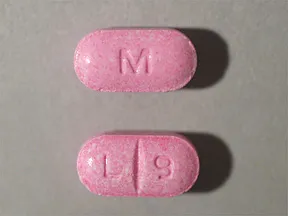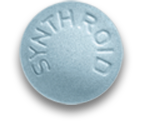


T4 absorption is increased by fasting, and decreased in malabsorption syndromes and by certain foods such as soybean infant formula.

The relative bioavailability of Levothyroxine Sodium Tablets, USP, compared to an equal nominal dose of oral levothyroxine sodium solution, is approximately 99%. The majority of the levothyroxine dose is absorbed from the jejunum and upper ileum. Levothyroxine is also effective in the suppression of pituitary TSH secretion in the treatment or prevention of various types of euthyroid goiters, including thyroid nodules, Hashimoto's thyroiditis, multinodular goiter and, as adjunctive therapy in the management of thyrotropin-dependent well-differentiated thyroid cancer (see INDICATIONS AND USAGE, PRECAUTIONS, DOSAGE AND ADMINISTRATION).Ībsorption - Absorption of orally administered T4 from the gastrointestinal (GI) tract ranges from 40% to 80%. Levothyroxine, at doses individualized according to patient response, is effective as replacement or supplemental therapy in hypothyroidism of any etiology, except transient hypothyroidism during the recovery phase of subacute thyroiditis. The physiologic actions of thyroid hormones are produced predominately by T3, the majority of which (approximately 80%) is derived from T4 by deiodination in peripheral tissues. The protein anabolic effects of thyroid hormones are essential to normal growth and development. The metabolic actions of thyroid hormones include augmentation of cellular respiration and thermogenesis, as well as metabolism of proteins, carbohydrates and lipids. Thyroid hormones regulate multiple metabolic processes and play an essential role in normal growth and development, and normal maturation of the central nervous system and bone. This hormone nuclear receptor complex activates gene transcription and synthesis of messenger RNA and cytoplasmic proteins. T3 and T4 diffuse into the cell nucleus and bind to thyroid receptor proteins attached to DNA. The mechanisms by which thyroid hormones exert their physiologic actions are not completely understood, but it is thought that their principal effects are exerted through control of DNA transcription and protein synthesis. When thyroid hormone levels decrease, TRH and TSH secretion increase. When serum T3 and T4 levels increase, TRH and TSH secretion decrease. Circulating serum T3 and T4 levels exert a feedback effect on both TRH and TSH secretion. TSH, in turn, is the physiologic stimulus for the synthesis and secretion of thyroid hormones, L-thyroxine (T4) and L-triiodothyronine (T3), by the thyroid gland. Thyrotropin-releasing hormone (TRH) released from the hypothalamus stimulates secretion of thyrotropin-stimulating hormone, TSH, from the anterior pituitary. Thyroid hormone synthesis and secretion is regulated by the hypothalamic-pituitary-thyroid axis.


 0 kommentar(er)
0 kommentar(er)
